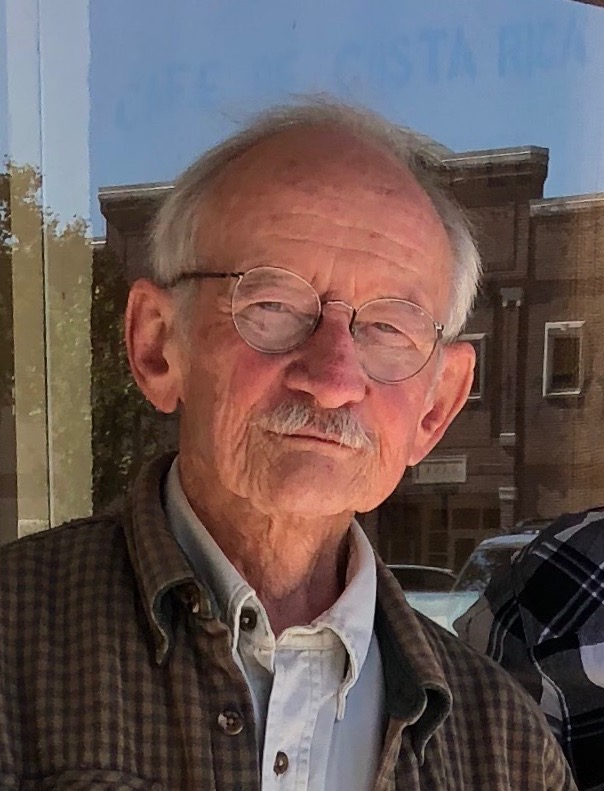Excerpt from “The American Grain of Ted Kooser,” an interview conducted for “The Poet and The Poem from the Library of Congress” in 2004.

Ted Kooser in 2017. Photo by Stancey Hancock.
Ted Kooser, who was born in Ames, Iowa, received his bachelor’s degree from Iowa State and his master’s in English from the University of Nebraska at Lincoln. He is the author of 39 books of poetry, non-fiction and children’s literature, including Delights & Shadows, which won the Pulitzer Prize in 2005. His other honors include two National Endowment for the Arts fellowships, a Pushcart Prize and the Stanley Kunitz Prize from Columbia University. This interview was conducted at the Library of Congress at the time of his inauguration as the 13th Poet Laureate of the United States.
Grace Cavalieri: We’re at the Library of Congress. Looking at the world through the sparkling clean pane of glass. Very clear, very exact.
Ted Kooser: Thank you.
Cavalieri: And all the senses are there. We have something to smell, we have something to taste, we have something to see. If I were to say that the one poet that you bring to mind is Stanley Kunitz, would you understand that?
Kooser: Yes I would. I admire Stanley Kunitz’s work a great deal.
Cavalieri: And there is at his, the center, a character sometimes in his work. But William Blake said the tear is an intellectual thing. Kunitz uses that as an epigraph, and that really brings you to mind, because you have brought the tear as a perfectly respectable part of the academy. There is always something to feel in your work.
Kooser: Well you know, if you don’t push the edge with your feelings, I don’t think you really have much of anything. There’s an old Charlie Chaplin movie in which Chaplin is skating along the edge of a mezzanine of a department store during construction, and there’s the chance always that he’s going to fall into the pit. And the thrill of watching that scene is holding your breath thinking that he’s going over the edge. Well that’s where you have to be when you’re writing. Out on that edge, I think.
Cavalieri: I call you the Poet of Affirmation. I mean, as much good will as you can bring in, that people can understand. I think that’s why you’re being applauded. Because we’ve waited a very long time to have something that belonged to everyone.
Kooser: Thank you.
Cavalieri: And your poetry, on the literal level, will belong to every nurse in the back ward, but can also be, I see, subject for some very philosophical thought. So, I’m looking forward to the rest of that book on your lap. But I want to say some things that people have talked about. Poetry Magazine says “Kooser documents the dignities, habits and small griefs of daily life. Our hunger for connection, our struggle to find balance.” And another, the Minneapolis Star Tribune says, “Kooser will one day rank along side Edgar Lee Masters, Robert Frost, and William Carlos Williams.”
Kooser: I’ll either rank beside them, or be lying beside them. Williams taught me to look at things like that. I’ve written several poems about these little moments in life, that there’s a little bit of tension that passes, and this is, I would guess, that most of the audience has experienced this.
Cavalieri: You have one poem that ends, “and no one to tell about it.”
Kooser: Oh yes.
Cavalieri: And now, I was wondering that you are going to be heard by millions of people, does that feeling change? Do you feel you’ll be heard? That what you have to tell will be heard?
Kooser: Well you know, I certainly hope that I’ll get some more readers out of this. It’s not a matter of wanting to make money selling books. I really enjoy having readers, and especially having people write letters to me and tell me a poem has meant something to them.
Cavalieri: I wish people would know that the poet really does want to hear. They always think, oh wouldn’t want to bother him. But, you know, quite the contrary. You don’t know anyone’s out there unless they do tell you.
Kooser: And I try to write myself. I try to write a card to somebody when I see a poem that I like.
Grateful acknowledgment to Grace Cavalieri and Forest Woods Media Productions’ “The Poet and the Poem” for permission to print this interview.
Grace Cavalieri's newest publication is What the Psychic Said (Goss Publications, 2020). She has twenty books and chapbooks of poetry in print, and has had 26 plays produced on American stages. She founded and still produces "The Poet and the Poem," a series for public radio celebrating 40 years on-air, now from the Library of Congress.. She received the 2013 George Garrett Award from The Associate Writing Programs. To read more by this author: Grace Cavalieri: Winter 2001; Introduction to "The Bunny and the Crocodile" Issue: Spring 2004; Grace Cavalieri on Roland Flint: Memorial Issue; Grace Cavalieri: Whitman Issue; Grace Cavalieri: Wartime Issue; Grace Cavalieri: Evolving City Issue; Grace Cavalieri: Split This Rock Issue; Grace Cavalieri on Ann Darr: Forebears Issue; Grace Cavalieri on "The Poet & The Poem": Literary Organizations Issue.